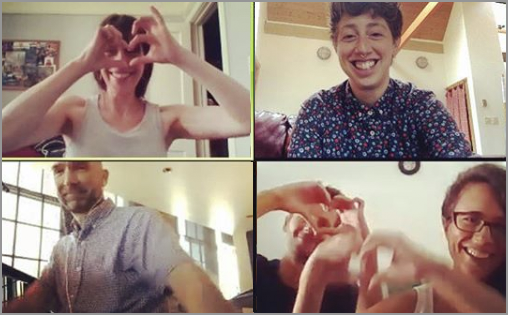The first time I was ever invited to a party, I panicked. At least, I think I did. It’s hard to remember—I was only four years old.
I remember that I didn’t understand the invite, and that it sounded like something I wouldn’t like, so I made it go away… by putting it directly into the bin. Soon afterwards I discovered (for the first time of many) that simply ignoring things doesn’t make them go away. The truth came out after my mum was questioned about our lack of reply. I remember feeling ashamed. Why hadn’t I reacted like everybody else? They’d just liked the idea right away! From that point on I worried a lot more about fitting in.
Like most children, I quickly learned to at least try to like what everybody else liked—clothes, cartoons, whatever. But I soon learned an additional, surprising, lesson. It wasn’t only that I had to like the right things. I had to like them the right amount. It seemed that the very concept of liking things at all was a little suspicious.
As we aged, it had become uncool to demonstrate enthusiasm for anything. This was easy to comprehend for my nerdier interests (like maths!). But I was occasionally shocked when being TOO enthusiastic even about something that everybody agreed was cool marked me out as weird.
To defend myself, I gradually learned to dial down my enthusiasm for everything, at least in public. It became a habit to hide both the things I cared about and the extent to which I cared about them. I thought I’d outgrown this, but I’ve been reflecting on the deep roots it left after coming across this Twitter thread.
The author joked to her therapist about “regressing” into obsession with some new show she’d discovered, and her therapist surprised her by saying “what’s wrong with that?”
The author talks about the shame she felt as a teenager, for liking things too obsessively, and I couldn’t help relating. As a young multipotentialite, I went through phases of obsession with TV shows, books, films, games… I was often frustrated that I couldn’t express those obsessions without standing out as weird.
I found a coping strategy, mentally tagging all of my interests as either “okay to publicly like–a little” and “too nerdy to publicly like at all” and behaved accordingly. But I can’t help wondering now if there could have been an alternative to policing my enthusiasm.
One possible alternative would be to have grown up in a different world, where passion and earnestness and difference are celebrated. Without a time machine, that’s not possible for me, but it does seem that our actual world has grown in this direction since my teenage days. It is now more widely understood that it’s okay to like things—even things that other people don’t like. Perhaps this is partly due to the rise of the internet, which makes it much easier to find your people. It’s certainly true that finding the Puttyverse as an adult helped me to embrace having so many diverse passions at once.
But the better alternative would have been to accept myself. I lacked confidence, so I struggled to be true to myself, and–worse–I participated in the policing of others who stepped out of line by expressing their individuality. At that point, it seemed easier to conform.
A self-confident person encourages others to express themselves, which creates freedom for self-expression too.
Reflecting back, I’m happy to see how far I’ve come. I no longer feel wrong for liking unpopular things. And because I accept myself I’m able to encourage others to explore their passions, too. I’ve learned that expressing myself is worth the discomfort it sometimes causes.
But I’m aware of ways in which I still hold myself back. For example, it’s rare that I’ll talk about something I like without also making a self-deprecating comment. I’ll say something like “I did an amazing Sudoku today… haha, I’m such a nerd!”
I find it difficult to imagine removing the joke, and saying, earnestly, “I did an amazing Sudoku today”. Even the thought makes me feel vulnerable.
It’s clear where this comes from. Years of being reflexively defensive have become a habit, and years of being more self-accepting haven’t completely undone it.
This sort of self-deprecation remains widespread. Since I started thinking about this, I’ve noticed friends and coworkers constantly joking about “nerding out” and making similar comments whenever they enjoy something about their jobs or learn something new. As a multipod, I’ve been told many times that it’s weird to be super interested in things, but I suppose it’s nice to realize that I’m far from alone in this.
I no longer feel wrong for liking unpopular things. And because I accept myself I’m able to encourage others to explore their passions, too. I’ve learned that expressing myself is worth the discomfort it sometimes causes.
Self-deprecation can be useful… sometimes.
Is my self-deprecation a problem, though? Part of me imagines that it is, that I ought to live more freely, without ever feeling the need to qualify myself or to be preemptively defensive.
But I think this is only a problem when I’m policing my own feelings. In other words, there’s no purpose to self-deprecating just for the benefit of my inner critic. Sometimes I’m just being negative about myself because I’ve internalized past criticism, which reinforces the belief that I ought to feel bad about liking things.
In contrast, and perhaps surprisingly, I think it’s fine to self-deprecate for others. It’s called self-deprecating humor for a reason: it’s funny! After all, I first developed this defensive habit because I learned that people like me more when I self-deprecate. I still want people to like me, so I still self-deprecate from time to time! So, rather than labeling this as a problem, perhaps I can view it as a skill that I’ve learned that still can help me to fit in when required.
You could argue that this shouldn’t be necessary, that we ought to build a world where everybody can celebrate their own unique interests. And I agree – I’d love to live in that world. I do my best to encourage others to embrace and enjoy their own uniqueness. Perhaps my self-deprecating comments are acting as tiny brakes on that world, still hinting that it’s somehow wrong to like unpopular things.
But I think it’s okay to make the occasional self-deprecating joke in order to fit into an as-yet imperfect world, as long as the joke is built on a foundation of self-acceptance.
It’s clear I still have a ways to go with self-acceptance, but also that I’ve come a long way. Let’s have a party to celebrate. I promise not to bin the invitation.
Your turn
Have you ever felt ashamed of being enthusiastic about something you like? How have you learned to deal with it? Share your stories and thoughts with the community in the comments.

Doing/being/exploring ALL THE THINGS is easier with a community!

Did you know we have a private community of hundreds of multipotentialites from around the world? We support each other, share advice and cheer each other on as we build lives and careers around ALL our passions.
Learn more and join the Puttyverse community here:


Brené Brown talks about how “cool” is practically by definition “not caring,” how it’s a dangerous emotional straitjacket, wrapped up with always wanting to be seen as in control. She would probably say that “Is it cool to care yet?” is exactly the wrong question to ask because the answer can never be yes. The point isn’t to try to get this question to a yes answer but, rather, to stop valuing cool precisely so that one can be comfortable caring.
Fantastic perspective! I agree – what makes self-acceptance so powerful is that it devalues the very idea of “cool” in the way we initially understand it. The important thing is to be comfortable expressing ourselves and embracing our passions regardless.
I ride a unicycle. Coolness isn’t something that ever came naturally from my interests.
What I try to gauge is how long I can keep talking about a subject before someone’s eyes glaze over. Depending on what I’m passionate about that week and who I’m talking to, that can be thirty seconds or half an hour.
As I’m really into getting in shape right now, I’m flooding my Instagram account with stories of my progress and using physical fitness hashtags. That way, the people who are interested in that topic can find my stories, and I don’t have to care how much I’m overdoing it at the moment. Niche pockets of social media lets you geek out as much as you want!
Love it, Paco! Finding the people and niches where you can really be yourself is so important.
I often self deprecated at work because I “geek out” over databases. I love the intricacies and possibilities of them and often when doing a presentation I go a little overboard and usually apologize for geeking out
In the past I would notice glazed looks and groans of there she goes again. But in my current job they laugh and say that it is a pleasure to see someone who loves what they do.
Amazing, it’s so lifegiving to be surrounded by people who give you permission to be you. I want to be that kind of person for others too. Thanks for sharing, Maggi!
In my 20s to 30s I was often accused of over-selling things like TV shows because I got so excited by them and recommended them to people too much. No one ever watched them, so I ended up censoring my excitement and now those same people complain that I never suggest activities, movies, music, etc when we’re hanging out. I’m now accused of being too stoic and withdrawn.
My therapist actually raised this issue last night with me and wants to help me get that part of myself back. I can’t wait. I miss being me and I can’t win either way, so I’d rather be happy!
Ah, I resonate with that so much, Kimberly! It’s exactly that cycle of learning to censor ourselves in some way, and then feeling like part of us is missing thereafter. I also love that sentiment: “I can’t win either way, so I’d rather be happy!” Such a great, practical way to choose how to be. Good luck reactivating your enthusiasm!